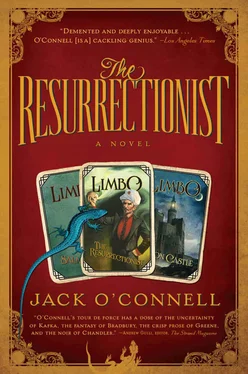She paused, trying to recreate a little of the original suspense.
“And Griswold took the pot?” Sweeney said.
Nora gave up a big, self-satisfied smile. “No,” she said, “Ernie took the pot. You’re missing my whole point, aren’t you? We gave Griswold seventy bucks and I bought Ernie and me the Jacuzzi down at the Mart.”
Sweeney put his coffee down and he and Nora stared at each other for a second. Then he said, “Look, I don’t want to upset you. But you don’t find that story a little. .” he fumbled, then tried, “macabre?”
“Macabre?” she said.
“How about disrespectful?”
“Disrespectful to who?”
“To your husband and you,” he said. “To the patient and his family.” She didn’t get upset. She patted his hand.
“You know what I find disrespectful?” she said and didn’t wait for an answer. “When they treated my husband like a vegetable in a warehouse. When they talked about him as if he wasn’t there. When some prissy little doctor would study my husband’s file as if Ernie was some math problem.”
She took out another cigarette but didn’t light it.
“Dr. Griswold said to me once, he said, ‘They’re still inside.’ He was convinced of it and he convinced me of it. He said the best way we could help them was to show them some faith. To show them we accept their new consciousness—”
The word was a button that brought Sweeney to life.
“Oh for Christ sake,” he said. “Their new consciousness? Jesus, Nora, this guy was a fucking nut.”
He was aware of people around them turning their heads in his direction, and he lowered his voice.
“They have no consciousness. That’s what this condition is. That’s the goddamn definition. They’ve lost consciousness.”
“If Danny has no consciousness,” Nora said, calm and serene, “then why did his father buy him special pajamas?”
Sweeney opened his mouth and closed it just as quickly. The question was a slap and it had the effect of flipping his anger into fear.
“I guess,” he said, “I bought them for myself.”
Nora was good with a cigarette in the way lifelong smokers often are. She pointed it at Sweeney’s chest and said, “There aren’t that many ways to get through this. You know I speak from experience. I’ve lived through some nights that most people can’t even imagine. Now you’re telling yourself you’re a stoic. And that’s keeping you from following your wife’s example. You’ve gotten rid of everything that existed before the accident. You’ve erased Cleveland. Everyone and everything you used to know. You’ve moved into this nightmare and you’ve started your vigil. Fine. But how long do you think it’ll be before you either take a swing at something other than a wall? Or get so scared that you want to trade places with your son?”
Sweeney’s throat was fully constricted. He said, “I’d give anything to trade places with Danny.”
“That,” Nora said, “we don’t get to choose. But we do get to choose how to think about this. You really want to believe that your son is a turnip who can still suck air?”
He lifted his coffee cup to throw it but Nora didn’t flinch.
“Or do you want to believe that Danny can’t wait to get in those new pajamas? That he knows when you’re next to him and that you still love him even though he’s not what he used to be?”
“It’s not a choice,” he said.
“It’s absolutely a choice,” she said. “It’s about the only option you’ve got left. Let me clue you in on something, honey. These doctors, they know a lot of impressive words and they’ve got enough attitude to choke a czar. But they have no idea what consciousness is. And don’t you let them tell you they do.”
All he could get out was her name and he said it like a request. He was exhausted and nauseated and he knew that no amount of breathing exercises would help.
Nora leaned over the table.
“If you don’t want Danny to be part of the game, then don’t let him. The game is nothing. But don’t start accepting someone else’s opinion about who your son is. They know their science. Maybe. But you know your boy. Right?”
He put down his cup and said, “I’ve got to go see him now.”
Nora put her free hand to her throat and touched her pearls. “You worry me, Sweeney,” she said.
He got up and left the cafeteria without another word.
HE RAN TODanny’s ward. People stepped out of his way. The floor outside 103 was newly mopped and he slid on the way in and fell on his ass. Alice Peck, who was hunched over Danny’s bed, turned and looked down at Sweeney.
“Are you all right?” she asked.
She started to offer a hand but he was already climbing to his feet.
“They should put up a sign,” he said.
Alice had a penlight in her hand. She was dressed in fitted black pants and a silk blouse. There was no sign of her lab coat.
“I was just checking in with the little guy,” she said. “But I can come back.”
This was a first. Sweeney had never heard a doctor offer to adjust her rounds to accommodate him.
“No, please,” he said, “I’ve got all day. I can come back later.”
Alice shook her head. “There’s no need. Unless it makes you uncomfortable to see him examined.”
“Were you examining him?” He looked at the bed and the night table for files or stethoscope, latex gloves or a new tube kit. There was nothing but the penlight she held in her hand.
“Nothing major,” she said. “Mostly I was just visiting.”
She bent over and used her fingers to pull Danny’s lids apart. She brought her head close to the boy’s, almost touching. She thumbed her penlight on, shined it into Danny’s right eye, and studied the eyeball for what seemed, to Sweeney, an unusually long time. She did the same thing with the left eye. Then, before raising her head, she did something that Sweeney had never seen any doctor do before. She kissed Danny on the forehead.
“Drives my father crazy,” she said as she came upright and saw the surprise on Sweeney’s face. “But it’s part of the therapy.” She smiled and added, “And I’m crazy for kids.”
When Sweeney didn’t respond, Alice said, “I’m sorry. Does it bother you?”
“Not at all,” he said. “It’s a nice change.”
She looked back to Danny, reached down, and ran a hand over the side of his skull.
“His hair’s like silk. I love it at this age.”
“He’s got his mother’s hair,” Sweeney said.
Alice nodded, took a last look at the boy, then motioned toward the hall with her head and said, “Be careful there. It still isn’t dry.”
Sweeney followed her outside. She looked up and down the corridor before she spoke.
“In the next week,” she said, “we’ll want to schedule a meeting with you.”
“Is everything all right?”
“Everything’s fine,” Alice said. “This is standard procedure at the Clinic. It’ll be my entire assessment team, Dr. Gögüs and Dr. Tannenbaum, maybe a therapist or an attending nurse. And possibly my father.”
“I’ve met Dr. Tannenbaum,” Sweeney said.
Alice bobbed her head and said, “He’s terrific, isn’t he? We’re thrilled to have him here.”
“What happens at the meeting?”
“It’s actually the first in a series of meetings. But in some ways it’s the most crucial. We’ll track through Danny’s condition from every possible angle. We look at full medical history. We study prior diagnosis and prognosis. We look at and evaluate all previous therapies. And we revisit the incident itself.”
“The accident,” Sweeney said.
“I tell you this,” Alice said, “to prepare you. For most families it’s a pretty grueling session. It’s tedious and it’s technical and some highly emotional material is presented in a pretty clinical fashion.”
Читать дальше












